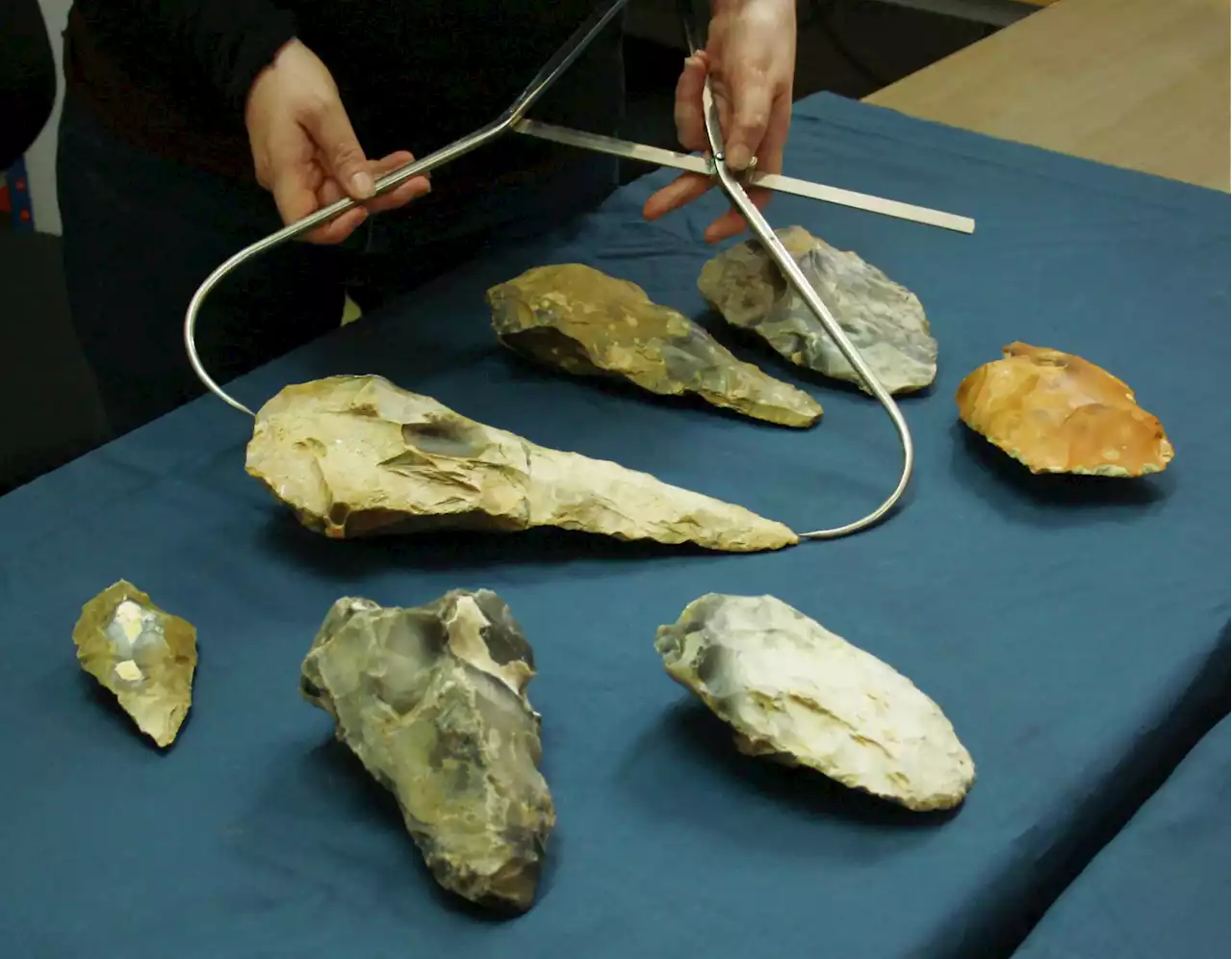Archaeologists from UCL Institute of Archaeology have unearthed some of Britain's largest early prehistoric stone tools. The dig, conducted in Kent prior to the construction of the Maritime Academy School in Frindsbury, unearthed ancient artifacts embedded in deep Ice Age sediments preserved on a
Several flint stone handaxes, some round, some pointed and of many different sizes, sit on a table. ASE Senior Archaeologist Letty Ingrey measures the largest giant handaxe using wide spring callipers. Credit: Archaeology South-East/ UCLhave unearthed some of Britain’s largest early prehistoric stone tools.
Amongst the unearthed artifacts were two extremely large flint knives described as “giant handaxes”. Handaxes are stone artifacts that have been chipped, or “knapped,” on both sides to produce a symmetrical shape with a long cutting edge. Researchers believe this type of tool was usually held in the hand and may have been used for butchering animals and cutting meat.
“These handaxes are so big it’s difficult to imagine how they could have been easily held and used. Perhaps they fulfilled a less practical or more symbolic function than other tools, a clear demonstration of strength and skill. While right now, we aren’t sure why such large tools were being made, or whichof early humans were making them, this site offers a chance to answer these exciting questions.
While archaeological finds of this age, including another spectacular ‘giant’ handaxe, have been found in the Medway Valley before, this is the first time they have been found as part of large-scale excavation, offering the opportunity to glean more insights into the lives of their makers.
United States Latest News, United States Headlines
Similar News:You can also read news stories similar to this one that we have collected from other news sources.
 Brain Gains: Scientists Discover How To Replicate the Cognitive Benefits of ExerciseAn injection of a specific blood factor can replicate exercise's brain benefits, offering potential treatments for age-related cognitive decline. Pre-clinical trials by University of Queensland scientists have found that an injection of a specific blood factor can replicate the benefits of exerci
Brain Gains: Scientists Discover How To Replicate the Cognitive Benefits of ExerciseAn injection of a specific blood factor can replicate exercise's brain benefits, offering potential treatments for age-related cognitive decline. Pre-clinical trials by University of Queensland scientists have found that an injection of a specific blood factor can replicate the benefits of exerci
Read more »
 Scientists discover a previously unknown way cells break down proteinsShort-lived proteins control gene expression in cells to carry out a number of vital tasks, from helping the brain form connections to helping the body mount an immune defense. These proteins are made in the nucleus and are quickly destroyed once they've done their job. The mechanism degrades short-lived proteins that support brain and immune functions.
Scientists discover a previously unknown way cells break down proteinsShort-lived proteins control gene expression in cells to carry out a number of vital tasks, from helping the brain form connections to helping the body mount an immune defense. These proteins are made in the nucleus and are quickly destroyed once they've done their job. The mechanism degrades short-lived proteins that support brain and immune functions.
Read more »
 Ice Age: Continental Drift: Where to Watch & Stream OnlineViewers must be curious to know where they can watch Ice Age: Continental Drift. Here's where it's available to stream online.
Ice Age: Continental Drift: Where to Watch & Stream OnlineViewers must be curious to know where they can watch Ice Age: Continental Drift. Here's where it's available to stream online.
Read more »
 Darwin’s Paradox of Coral Reefs Solved – Scientists Unravel Age-Old MysteryA new study led by the University of Southampton in the UK has uncovered why coral reefs flourish in waters that appear to be deficient in nutrients, a phenomenon that has fascinated scientists since Charles Darwin. The research shows that corals farm and feed on their photosynthetic symbionts –
Darwin’s Paradox of Coral Reefs Solved – Scientists Unravel Age-Old MysteryA new study led by the University of Southampton in the UK has uncovered why coral reefs flourish in waters that appear to be deficient in nutrients, a phenomenon that has fascinated scientists since Charles Darwin. The research shows that corals farm and feed on their photosynthetic symbionts –
Read more »
 How We Age—and How Scientists Are Working to Turn Back the ClockInsights into the underlying mechanisms of aging are revolutionizing the hunt for longevity treatments
How We Age—and How Scientists Are Working to Turn Back the ClockInsights into the underlying mechanisms of aging are revolutionizing the hunt for longevity treatments
Read more »
